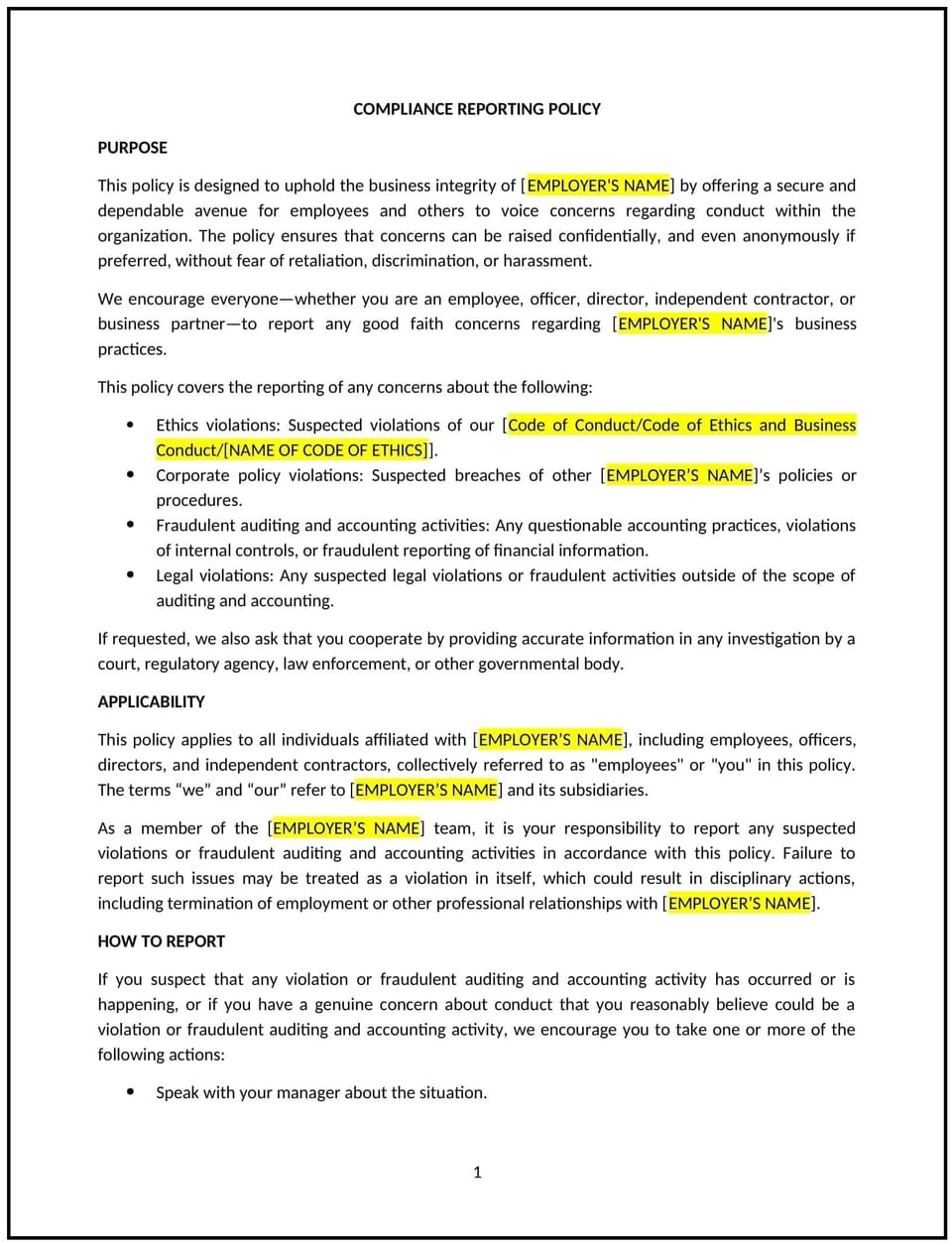Compliance reporting policy (Kentucky): Free template

Compliance reporting policy (Kentucky)
A compliance reporting policy establishes the procedures for Kentucky businesses to identify, report, and address non-compliance with laws, regulations, or internal policies. This policy provides clear guidelines for employees to report concerns, outlines the organization’s commitment to investigating issues, and ensures appropriate corrective actions are taken.
By implementing this policy, businesses can promote transparency, reduce risks, and demonstrate their dedication to ethical practices and regulatory compliance.
How to use this compliance reporting policy (Kentucky)
- Define reportable issues: Clearly specify the types of non-compliance employees should report, such as violations of laws, regulations, or company policies.
- Outline reporting procedures: Provide step-by-step instructions for reporting concerns, including available channels such as a hotline, email, or direct communication with a compliance officer.
- Emphasize confidentiality: Assure employees that their reports will be handled discreetly, with confidentiality maintained to the fullest extent possible.
- Prohibit retaliation: Clearly state that employees who report concerns in good faith are protected from retaliation and disciplinary action.
- Detail investigation steps: Explain how the business will investigate reported issues, including timelines, responsible parties, and how outcomes will be communicated.
- Address corrective actions: Describe the possible measures the company may take to resolve non-compliance, such as additional training, policy updates, or disciplinary actions.
- Include management responsibilities: Highlight the role of managers in fostering a culture of compliance and supporting employees who report concerns.
Benefits of using this compliance reporting policy (Kentucky)
This policy offers several advantages for Kentucky businesses:
- Promotes transparency: Encourages employees to report issues, helping businesses identify and address problems early.
- Reduces risks: Supports compliance with laws and regulations, minimizing the potential for fines or reputational damage.
- Builds trust: Demonstrates the business’s commitment to ethical practices and a safe reporting environment.
- Strengthens accountability: Establishes clear expectations for employees and management in maintaining compliance.
- Enhances operational integrity: Ensures that issues are investigated and resolved effectively, improving overall organizational performance.
Tips for using this compliance reporting policy (Kentucky)
- Communicate the policy clearly: Share the policy with employees during onboarding and provide regular reminders about the reporting process.
- Train employees and managers: Offer training on identifying non-compliance, using reporting channels, and maintaining confidentiality.
- Monitor reporting systems: Regularly review the effectiveness of reporting channels to ensure accessibility and reliability.
- Foster a culture of openness: Encourage employees to report concerns without fear of retaliation or negative consequences.
- Review and update regularly: Adjust the policy to reflect changes in Kentucky laws, industry standards, or company practices.
Q: What is the purpose of a compliance reporting policy?
A: The policy provides a framework for identifying and reporting non-compliance with laws, regulations, or internal policies, ensuring issues are addressed promptly.
Q: What types of issues should be reported under this policy?
A: Employees should report violations of laws, regulations, company policies, or ethical standards, including fraud, harassment, or safety concerns.
Q: How can employees report compliance concerns?
A: Employees can report concerns through designated channels, such as a hotline, email, or directly to a compliance officer, as outlined in the policy.
Q: Are reports kept confidential?
A: Yes, the policy emphasizes maintaining confidentiality to the fullest extent possible while investigating reported concerns.
Q: Are employees protected from retaliation?
A: Employees who report concerns in good faith are protected from retaliation, as stated in the policy.
Q: What happens after a compliance concern is reported?
A: Reported issues are investigated according to the policy’s procedures, with outcomes and corrective actions communicated appropriately.
Q: How often should the compliance reporting policy be reviewed?
A: The policy should be reviewed annually or as needed to reflect updates in Kentucky laws, regulations, or business practices.
Q: What role do managers play in compliance reporting?
A: Managers are responsible for fostering a culture of compliance, supporting employees who report concerns, and ensuring the policy is applied consistently.
This article contains general legal information and does not contain legal advice. Cobrief is not a law firm or a substitute for an attorney or law firm. The law is complex and changes often. For legal advice, please ask a lawyer.


